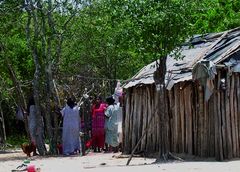Article published in the special Newsletter '15 years of PBI', October 2009
Anita Linares, volunteer from Switzerland (2004-2006)
The José Alvear Restrepo Lawyers’ Collective supports communities affected by carbon extraction in La Guajira Department.
In April 2006 PBI accompanied the José Alvear Restrepo Lawyers’ Collective (CCAJAR) and the Swiss NGO, Swiss Working Group on Colombia (ASK) to La Guajira Department, visiting communities around the Cerrejón mine, the biggest open-pit coalmine in Colombia. The purpose of this journey was to meet victims evicted from the village of Tabaco, to gather information in the communities about the impacts of coal-mining (contamination, health, education, employment and infrastructure), to provide possible legal advice for negotiations between the company doing the mining and the communities with regards to their displacement, and to include these communities in the reparation process with Tabaco.
Many meetings, moments and impressions from this journey remain engraved on my memory; the most memorable of these are the following:
I was saddened by the heartrending situation of the villages around the mine, hit by the economic interests of multinational companies. The communities live in precarious conditions, the land is contaminated and infertile and the vegetables do not grow. The contamination generates serious health problems and movement in the area is limited due to road closures. The royalties are not invested in the infrastructure of the villages closest to the mine. The local population has little chance of gaining employment in the mine and several communities are at risk of being displaced.
The meeting with the victims evicted from the village of Tabaco gave me an even better understanding of what being displaced means. Not only is their economic situation worse, making them dependant on help from their families, but they also suffer the consequences of the breakdown of the community’s social fabric. In spite of their difficult experiences they maintain the spirit and the strength needed to continue fighting for the restoration of their basic rights, and for the receipt of adequate reparation. This reparation would not only give them the chance to rebuild a dignified life and the social fabric of the community, it would also allow them to negotiate better conditions for other communities at risk of being displaced.
I was surprised by the strong commitment of organisations such as CCAJAR and its members. They continue to support the just fight of disadvantaged peoples and to offer their knowledge and resources in order to provide advice. Even though they live in precarious conditions, the Colombian people do not lose their positive spirit or their capacity to enjoy life.
Due to bad weather and a road closure at 6 pm it was impossible to return to Albania. We were taken in by a family in Remedios. They provided generous hospitality and even organised a «very Colombian» party. We all enjoyed ourselves and danced late into the night.

